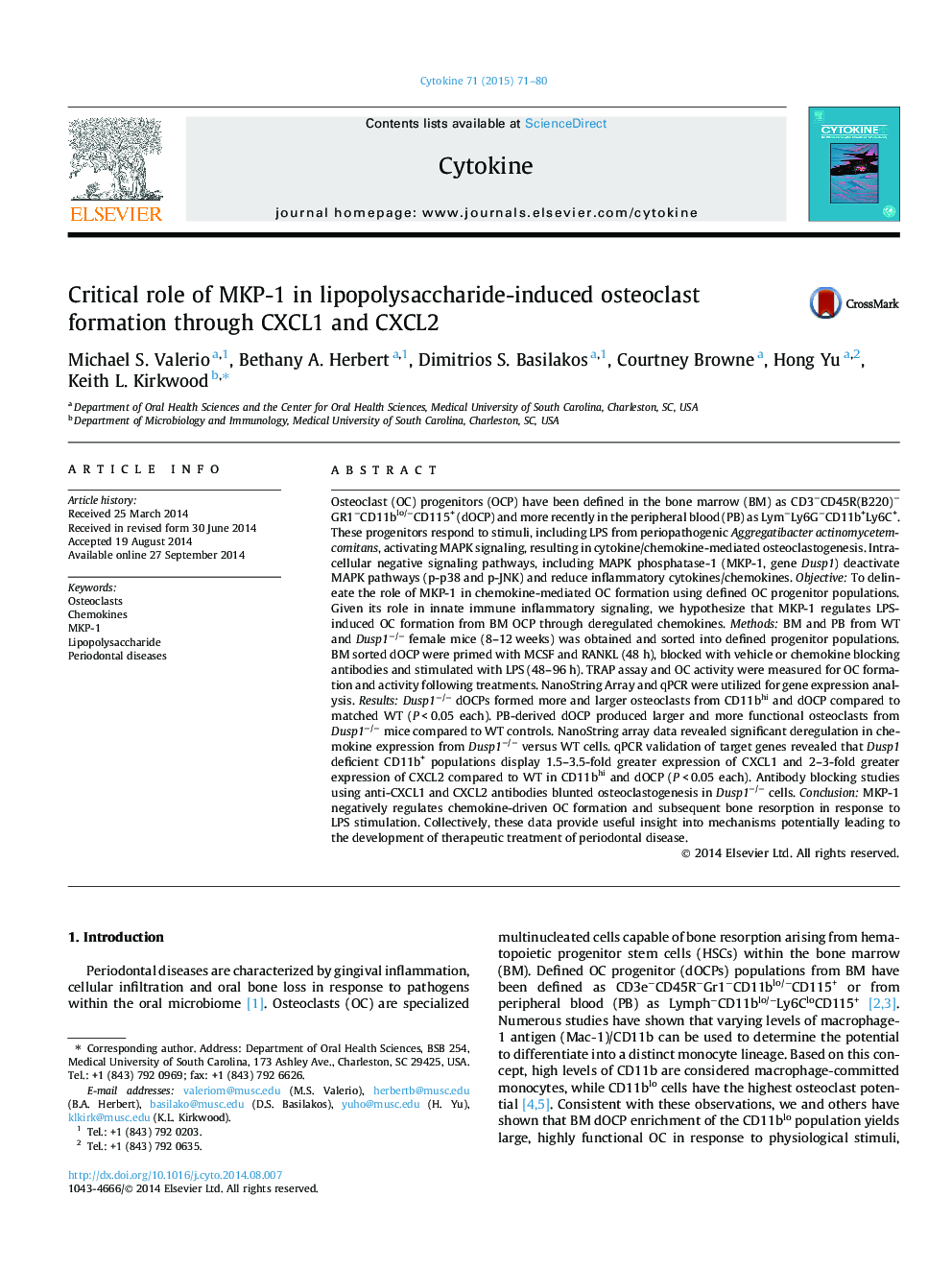| کد مقاله | کد نشریه | سال انتشار | مقاله انگلیسی | نسخه تمام متن |
|---|---|---|---|---|
| 5897062 | 1155253 | 2015 | 10 صفحه PDF | دانلود رایگان |

- Dusp1â/â dOCPs are hyper-osteoclastogenic in response to LPS through a mechanism independent of NFATc1.
- CXCL1 and CXCL2 are necessary for LPS-induced OC formation.
- Cxcl1 and Cxcl2 expression is regulated by MKP-1.
- Dusp1â/â dOCPs are hyper-osteoclastogenic in response to equivalent amounts of recombinant chemokine.
Osteoclast (OC) progenitors (OCP) have been defined in the bone marrow (BM) as CD3âCD45R(B220)âGR1âCD11blo/âCD115+ (dOCP) and more recently in the peripheral blood (PB) as LymâLy6GâCD11b+Ly6C+. These progenitors respond to stimuli, including LPS from periopathogenic Aggregatibacter actinomycetemcomitans, activating MAPK signaling, resulting in cytokine/chemokine-mediated osteoclastogenesis. Intracellular negative signaling pathways, including MAPK phosphatase-1 (MKP-1, gene Dusp1) deactivate MAPK pathways (p-p38 and p-JNK) and reduce inflammatory cytokines/chemokines. Objective: To delineate the role of MKP-1 in chemokine-mediated OC formation using defined OC progenitor populations. Given its role in innate immune inflammatory signaling, we hypothesize that MKP-1 regulates LPS-induced OC formation from BM OCP through deregulated chemokines. Methods: BM and PB from WT and Dusp1â/â female mice (8-12Â weeks) was obtained and sorted into defined progenitor populations. BM sorted dOCP were primed with MCSF and RANKL (48Â h), blocked with vehicle or chemokine blocking antibodies and stimulated with LPS (48-96Â h). TRAP assay and OC activity were measured for OC formation and activity following treatments. NanoString Array and qPCR were utilized for gene expression analysis. Results: Dusp1â/â dOCPs formed more and larger osteoclasts from CD11bhi and dOCP compared to matched WT (PÂ <Â 0.05 each). PB-derived dOCP produced larger and more functional osteoclasts from Dusp1â/â mice compared to WT controls. NanoString array data revealed significant deregulation in chemokine expression from Dusp1â/â versus WT cells. qPCR validation of target genes revealed that Dusp1 deficient CD11b+ populations display 1.5-3.5-fold greater expression of CXCL1 and 2-3-fold greater expression of CXCL2 compared to WT in CD11bhi and dOCP (PÂ <Â 0.05 each). Antibody blocking studies using anti-CXCL1 and CXCL2 antibodies blunted osteoclastogenesis in Dusp1â/â cells. Conclusion: MKP-1 negatively regulates chemokine-driven OC formation and subsequent bone resorption in response to LPS stimulation. Collectively, these data provide useful insight into mechanisms potentially leading to the development of therapeutic treatment of periodontal disease.
Journal: Cytokine - Volume 71, Issue 1, January 2015, Pages 71-80